3.1. The word stress
In
OE the stress usually fell on the first syllable of the word, rarely
on its second syllable: the prefix or the root of the word could be
stressed while the suffixes and endings were unaccented. Word stress
in OE was fixed: it never moved in inflection and seldom in
derivation.
This
way of word accentuation, characteristic of OE, was considerably
altered in the succeeding periods. The
word accent acquired greater positional freedom and began to play a
more important role in word derivation.
These changes were connected with the phonetic assimilation of
thousands of loan-words adopted during the ME period.
New
accentual patterns are found in numerous ME loan-words from French.
Probably, when they first entered the English language they retained
their original stress – on the ultimate or pen-ultimate syllable.
Gradually, as the loan-words were assimilated, the word stress was
moved closer to the beginning of the word in line with the English
(Germanic) system. In disyllabic words the accent moved to the first
syllable, so that the resulting pattern conformed to the pattern of
native words, e.g. ME vertu
[ver’tju:] became NE virtue
[‘və:ə],
cf. native English shortly,
childish.
The shift can be shown as follows: s’s>’ss (s stands for
«syllable»).
In words of three or more
syllables the shift of the stress could also be caused by the
«rhythmic» tendency, which required a regular alternation
of stressed and unstressed syllables. Under the rhythmic tendency, a
secondary stress would arise at a distance of one syllable from the
original stress. This new stress was either preserved as a secondary
stress or else became the only or the principal stress of the word,
e.g.
ME
recommenden
[reko’mendən] > NE recommend
[rekə’mend]
– ss’ss
> ss’s;
ME
disobeien
[diso’beiən] > NE disobey
[‘diso’bei] – ss’ss
> ‘ss’s;
ME
comfortable
[komfor’tablə]>NE comfortable
[‘kmfətəbl]
– ss:>’sss.
Sometimes
the shifting of the word stress should be attributed not only to the
phonetic tendencies but also to certain morphological factors. Thus
stress was not shifted to the prefixes of many verbs borrowed or
built in Late ME and in Early NE, which accords with the
OE
rule: to keep verb prefixes unstressed, e.g. ME accepten
‘accept’,
engendren
‘engender’,
presenten
‘present’.
Cf. NE verbs befall,
mistake,
forget.
Corresponding nouns sometimes, though not always, received the stress
on the first syllable: NE ‘present
n – pre’sent
v; ‘discord
n
– dis’cord
v. The latter pairs of words show that the role of word accentuation
has grown: word stress performs a phonological function as it
distinguishes a verb from a noun.
Thus, the entire system of
word accentuation has altered. The position of word stress has become
relatively free and its phonological application has widened: it can
be shifted in word derivation, though it is never moved in building
grammatical forms.
-
Vowels in the unstressed position
All vowels in the
unstressed position changed and became [ə] or [i] unstressed. This
phonetic change had a far-reaching effect upon the system of the
grammatical endings of the English words, which now due to the
process of reduction became homonymous. For example:
-
forms of strong verbs
OE
writan
—
wrāt – writon
–
writen
with
the suffixes –an,
-on, -en
different only in the vowel component became homonymous in ME:
written
–
wrōt
– writen
–
writen
-
forms of nouns
O
plural a-stem fiscas
ME fisces
genitive
singular fisces
or
O
singular fisce
ME fisce
genitive
plural fisca
Соседние файлы в предмете [НЕСОРТИРОВАННОЕ]
- #
- #
- #
- #
- #
- #
- #
- #
- #
- #
- #
MIDDLE ENGLISH: CHANGES IN PHONETIC SYSTEM Word Stress In OE stress as a rule was on the 1 -st syllable of the word, rarely on the second syllable.
That is the prefix or the root were stressed but the suffixes and endings were unstressed. Word stress in OE was fixed. It didn’t move in inflection and rarely in derivation.
In ME period the word stress acquired greater positional freedom and began to play a more important role in word derivation. These changes were connected with the assimilation of the loan words (especially from French).
When they first appeared in the English language they probably retained their original stress – on the ultimate syllable. This kind of stress couldn’t be preserved for long.
The loan words were assimilated and the stress moved closer to the beginning of the word. M. E. vertu [vqr’tj. H] NE virtue [‘v. Wt. Sq]
Vowel Changes Unstressed vowels: In Early ME the pronunciation of unstressed syllables became increasingly indistinct. In OE there were 5 short vowels in an unstressed position [e, I, a, o, V]
Late ME had only 2 vowels: [q] and [i] OE fiscas – ME fishes [‘f. ISqz] OE rison – ME risen [‘r. Izqn]
The occurrence of only two vowels [q] and [i] in unstressed final syllables is an important mark of ME.
It distinguishes ME on the one hand from OE with its greater variety of unstressed vowels, and, on the other hand, from New English when ME final [q] was dropped.
The final [q] disappeared in Late ME but it continued to be spelt as e. In the London dialect of Chaucer’s time it was unstable. It could be easily missed out before the following initial vowel or when required by rhythm.
When the ending e survived only in spelling, it was understood as means of showing the length of the vowel in the preceding syllable and was added to the
words which did not have this ending before: OE stan – ME stoon, stone
But new unstressed vowels appeared in borrowed words or developed from stressed ones, as a result of various changes: e. g. vocalization of [r] writer [er] [q] actor [or] [q]
Stressed Vowels: Stressed vowels changed in quality and in quantity. Not a single OE monophthong or diphthong remained unchanged in the course of history.
Long vowels were the most changeable and historically unstable. They had a strong tendency to become narrower and to diphthongize, but short vowels displayed a reverse trend – towards greater openness.
Quantitative Changes: In OE quantity was the main basis of correlation in the vowel system: short vowels were opposed to long ones.
Vowel length was an inherited feature as OE short vowels developed from PG short vowels. In late OE and Early ME vowel length began to depend on phonetic condition.
1. Short vowels were lengthened before ld, nd, mb unless followed by a third consonant (the 9 -th c. ) OE wild > ME wild [w. Jld]
2. All other groups of two or more consonants made the preceding long vowels short (11 -th c. ). OE cepte > ME kepte [‘keptq]
3. Short vowels became long in open syllables (mainly [e], [a], [o]) (12 -th – 13 -th c. ) OE open > ME open [‘Lpqn] OE namu > ME name [‘n. Rmq]
Qualitative Changes: 1. OE [y], [y: ] disappeared in ME merging with various sounds in different dialects: In Kentish [e] [e: ] South-West, west Midlands [u] [H]
OE fyllan > ME Kentish fellen (to fill) West Midland fullen 1. [fyllqn] and South western 2. [fullqn] East Midland fillen and Northern
2. OE [R] was narrowed to [L] (all long monophthongs became closer) [R] > [L] in all the dialects except the Northern group
OE stan > ME stoon, stone [‘st. Ln(q)] (stone) Northern stan(e) ME [L] must have been a more open vowel than long [o: ] inherited from OE
3. OE short [x] > ME back [a] e. g. OE þxt > ME that [a] OE earm > ME arm [a] OE blacu > ME blak [a]
Diphthongs One of the most important sound changes of the Early ME period was the loss of OE diphthongs and the growth of new ones. OE diphthongs were contracted to monophthongs:
OE [e. Q] > ME [F: ] east > eest (east) OE [e. Q] > ME [a] earm > arm (arm)
[eo] [e: ] [e] [io] [J] [I] [io] deop > deep [e: ] (deep); ceosan > chesen [‘Ce: zqn] (choose) heorte > herte (heart)
As a result of these changes the vowel system lost two sets of diphthongs, long and short. A new set of diphthongs developed from some sequence of vowels and consonants due to the vocalization of OE [j] and [ɣ].
These sounds between and after vowels changed into [i] and [u] formed diphthongs together with the preceding vowels. E. g. OE dx. Z > ME day [da. I]
These changes gave rise to two sets of diphthongs with i – glides and u – glides.
System of vowels in Late Middle English
Evolution of Consonants English consonants were far more stable than vowels.
The most important developments in the history of English consonants were the development of affricates and sibilants. In OE there were no affricates and no sibilants except [s, z].
The new type of consonants developed from OE palatal plosives [k’, g’] and from [sk’]. The three new phonemes were [C], [G], [S] (in writing — ch, tch, g, dg, sh, sch)
Loss of Consonants In OE long consonants were opposed to short. In Late ME long consonants were shortened and the opposition through quantity was lost.
Initial h was dropped before r, l, n. OE hrin. Z > ME ring (ring) OE hlaford > ME loverd (lord)
Before w h remained in the North where OE hw > quh or qwh. In the South h was dropped before w. OE hwxt > ME North quhat South what
V was dropped before consonants: OE hxfde > ME had
Скачать материал

Скачать материал




- Сейчас обучается 268 человек из 64 регионов




Описание презентации по отдельным слайдам:
-
1 слайд
MIDDLE ENGLISH:
CHANGES IN PHONETIC SYSTEMWord Stress
In OE stress as a rule was on the 1-st syllable of the word, rarely on the second syllable.
-
2 слайд
That is the prefix or the root were stressed but the suffixes and endings were unstressed. Word stress in OE was fixed. It didn’t move in inflection and rarely in derivation.
-
3 слайд
In ME period the word stress acquired greater positional freedom and began to play a more important role in word derivation. These changes were connected with the assimilation of the loan words (especially from French).
-
4 слайд
When they first appeared in the English language they probably retained their original stress – on the ultimate syllable. This kind of stress couldn’t be preserved for long.
-
5 слайд
The loan words were assimilated and the stress moved closer to the beginning of the word.
M.E. vertu [vqr’tjH] NE virtue [‘vWtSq] -
6 слайд
Vowel Changes
Unstressed vowels:became increasingly indistinct
in OE there were 5 short vowels in an unstressed position [e, I, a, o, V] -
7 слайд
Late ME had only 2 vowels: [q] and [i]
OE fiscas – ME fishes [‘fISqz]
OE rison – ME risen [‘rIzqn] -
8 слайд
The occurrence of only two vowels [q] and [i] in unstressed final syllables is an important mark of ME.
-
9 слайд
It distinguishes ME on the one hand from OE with its greater variety of unstressed vowels, and, on the other hand, from New English when ME final [q] was dropped.
-
10 слайд
The final [q] disappeared in Late ME but it continued to be spelt as e. In the London dialect of Chaucer’s time it was unstable. It could be easily missed out before the following initial vowel or when required by rhythm.
-
11 слайд
When the ending e survived only in spelling, it was understood as means of showing the length of the vowel in the preceding syllable and was added to the
-
12 слайд
words which did not have this ending before:
OE stan – ME stoon, stone -
13 слайд
But new unstressed vowels appeared in borrowed words or developed from stressed ones, as a result of various changes:
e.g. vocalization of [r]
writer [er] [q]
actor [or] [q] -
14 слайд
Stressed Vowels:
Stressed vowels changed in quality and in quantity. Not a single OE monophthong or diphthong remained unchanged in the course of history.
-
15 слайд
Quantitative Changes:
In OE quantity was the main basis of correlation in the vowel system: short vowels were opposed to long ones.
-
16 слайд
Vowel length was an inherited feature as OE short vowels developed from PG short vowels. In late OE and Early ME vowel length began to depend on phonetic condition.
-
17 слайд
1. Short vowels were lengthened before ld, nd, mb unless followed by a third consonant (the 9-th c.)
OE wild > ME wild [wJld] -
18 слайд
2. All other groups of two or more consonants made the preceding long vowels short (11-th c.)
OE cepte > ME kepte [‘keptq] -
19 слайд
3. Short vowels became long in open syllables (mainly [e], [a], [o]) (12-th – 13-th c.)
OE open > ME open [‘Lpqn]
OE namu > ME name [‘nRmq] -
20 слайд
Qualitative Changes:
1. OE [y], [y:] disappeared in ME merging with various sounds in different dialects:
In Kentish [e] [e:]
South-West, west Midlands [u] [H] -
21 слайд
OE fyllan > ME Kentish fellen
(to fill)
West Midland fullen 1. [fyllqn]
and South western 2. [fullqn]East Midland fillen
Northern -
22 слайд
2. OE [R] was narrowed to [L] (all long monophthongs became closer)
[R] > [L] in all the dialects except the Northern group -
23 слайд
OE stan > ME stoon, stone [‘stLn(q)]
(stone)
Northern stan(e)ME [L] must have been a more open vowel than long [o:] inherited from OE
-
24 слайд
3. OE short [x] > ME back [a]
e.g. OE þxt > ME that [a]
OE earm > ME arm [a]
OE blacu > ME blak [a] -
25 слайд
Diphthongs
One of the most important sound changes of the Early ME period was the loss of OE diphthongs and the growth of new ones.
-
26 слайд
Diphthongs> monophthongs
OE diphthongs were contracted to monophthongs:
OE [eQ] > ME [F:] east > eest (east)
OE [eQ] > ME [a] earm > arm (arm) -
27 слайд
[eo]
[eo] [e:] [e]
[io] [J] [I]
[io]
deop > deep [e:] (deep);
ceosan > chesen [‘Ce:zqn] (choose)
heorte > herte (heart) -
28 слайд
the vowel system lost two sets of diphthongs, long and short.
a new set of diphthongs developed from some sequence of vowels and consonants due to the vocalization of OE [j] and [g]. -
29 слайд
These sounds between and after vowels changed into [i] and [u] and formed diphthongs together with the preceding vowels:
E.g. OE dxZ > ME day [daI] -
30 слайд
two sets of diphthongs
These changes gave rise to two sets of diphthongs with i – glides and u – glides. -
31 слайд
System of vowels in Late Middle English
-
32 слайд
Evolution of Consonants
English consonants were far more stable than vowels.
-
33 слайд
The new type of consonants developed from OE palatal plosives [k’, g‘, g’] and from [sk’]. The three new phonemes were [C], [G], [S] (in writing — ch, tch, g, dg, sh, ssh, sch)
-
34 слайд
Loss of Consonants
In OE long consonants were opposed to short. In Late ME long consonants were shortened and the opposition through quantity was lost.
-
35 слайд
Initial h was dropped before r, l, n.
OE hrinZ > ME ring (ring)
OE hlaford > ME loverd (lord) -
36 слайд
Before w h remained in the North where OE hw > quh or qwh.
In the South h was dropped before w.OE hwxt > ME North quhat
South what -
37 слайд
V was dropped before consonants:
OE hxfde > ME had
Найдите материал к любому уроку, указав свой предмет (категорию), класс, учебник и тему:
6 210 158 материалов в базе
-
Выберите категорию:
- Выберите учебник и тему
- Выберите класс:
-
Тип материала:
-
Все материалы
-
Статьи
-
Научные работы
-
Видеоуроки
-
Презентации
-
Конспекты
-
Тесты
-
Рабочие программы
-
Другие методич. материалы
-
Найти материалы
Другие материалы
Тест по Новой истории Латинской Америки
- Учебник: «Всеобщая история. Новейшая история», Юдовская А.Я., Баранов П.А., Ванюшкина Л.М. и др./Под ред. Искендерова А.А.
- Тема: Глава 3. Азия, Африка и Латинская Америка в XIX — начале ХХ в.
- 11.01.2021
- 6170
- 135

Отчет работы кружка «Дари добро»
- Учебник: «Экономика: история и современная организация хозяйственной деятельности», Липсиц И.В.
- Тема: Тема 2. Как устроена хозяйственная жизнь человечества
- 11.01.2021
- 2877
- 1

- 11.01.2021
- 2668
- 0
- 11.01.2021
- 2700
- 0
- 11.01.2021
- 2938
- 3

- 11.01.2021
- 2980
- 1
- 11.01.2021
- 2693
- 0
Вам будут интересны эти курсы:
-
Курс повышения квалификации «Основы местного самоуправления и муниципальной службы»
-
Курс повышения квалификации «Организация научно-исследовательской работы студентов в соответствии с требованиями ФГОС»
-
Курс повышения квалификации «Применение MS Word, Excel в финансовых расчетах»
-
Курс повышения квалификации «Маркетинг в организации как средство привлечения новых клиентов»
-
Курс повышения квалификации «Организация практики студентов в соответствии с требованиями ФГОС медицинских направлений подготовки»
-
Курс профессиональной переподготовки «Организация менеджмента в туризме»
-
Курс повышения квалификации «Страхование и актуарные расчеты»
-
Курс повышения квалификации «Финансы предприятия: актуальные аспекты в оценке стоимости бизнеса»
-
Курс профессиональной переподготовки «Организация деятельности секретаря руководителя со знанием английского языка»
-
Курс профессиональной переподготовки «Организация деятельности специалиста оценщика-эксперта по оценке имущества»
-
Курс профессиональной переподготовки «Осуществление и координация продаж»
-
Курс профессиональной переподготовки «Технический контроль и техническая подготовка сварочного процесса»
-
Курс профессиональной переподготовки «Гражданско-правовые дисциплины: теория и методика преподавания в образовательной организации»
Слайд 1
MIDDLE ENGLISH:
CHANGES IN PHONETIC SYSTEM
Word Stress
In OE stress as
a rule was on the 1-st syllable of the word,
rarely on the second syllable.
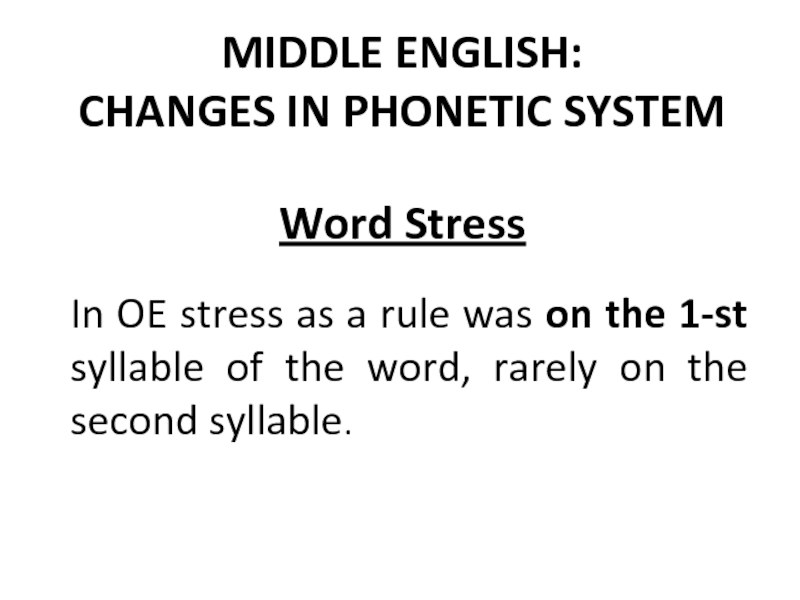
Слайд 2That is the prefix or the root were stressed but
the suffixes and endings were unstressed. Word stress in OE
was fixed. It didn’t move in inflection and rarely in derivation.
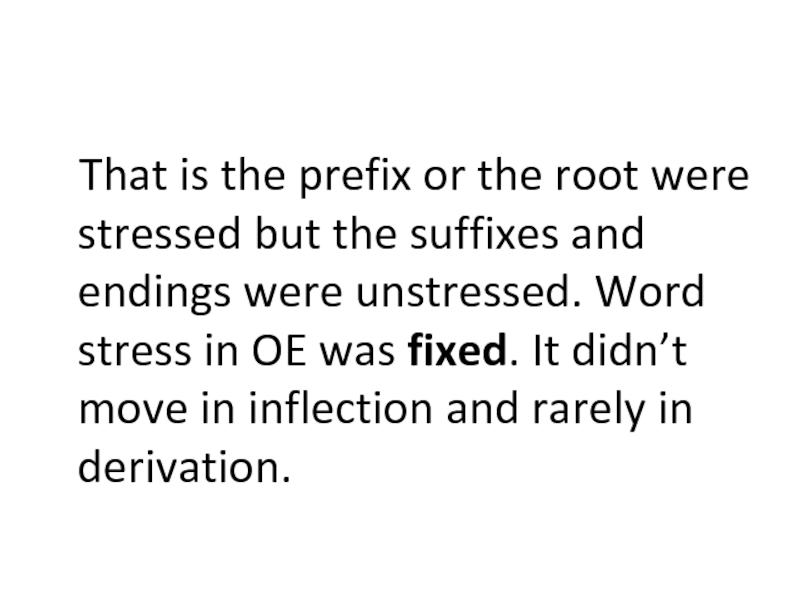
Слайд 3In ME period the word stress acquired greater positional freedom
and began to play a more important role in word
derivation. These changes were connected with the assimilation of the loan words (especially from French).

Слайд 4When they first appeared in the English language they probably
retained their original stress – on the ultimate syllable. This
kind of stress couldn’t be preserved for long.
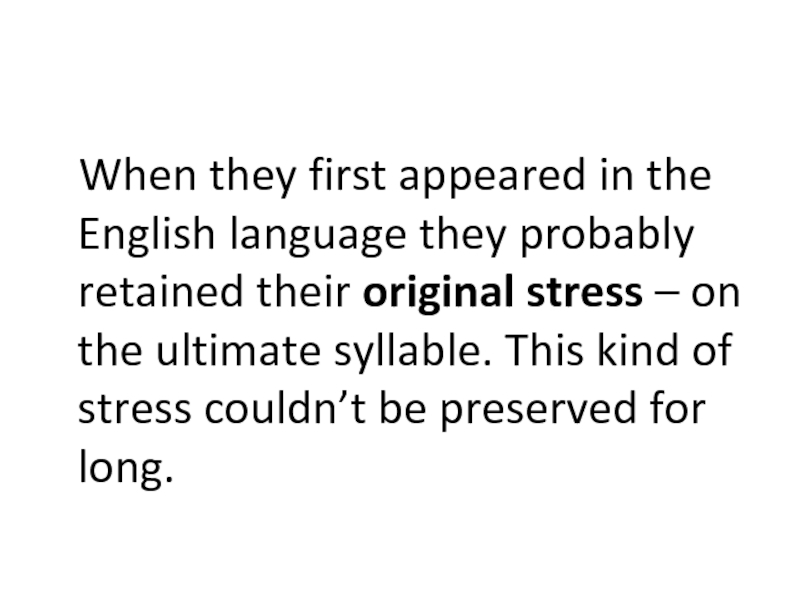
Слайд 5The loan words were assimilated and the stress moved closer
to the beginning of the word.
ME vertu [vqr’tjH] NE
virtue [‘vWtSq]
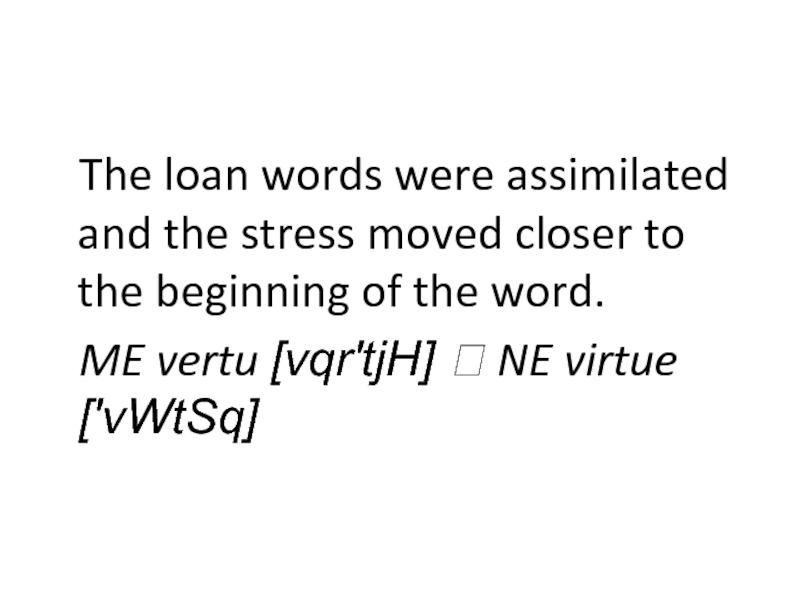
Слайд 6
Vowel Changes
Unstressed vowels:
became increasingly indistinct
in OE there were
5 short vowels in an unstressed position [e, I, a,
o, V]

Слайд 7Late ME had only 2 vowels: [q] and [i]
OE fiscas
– ME fishes [‘fISqz]
OE rison – ME risen [‘rIzqn]
![MIDDLE ENGLISH: CHANGES IN PHONETIC SYSTEM Word Stress Late ME had only 2 vowels: [q] and [i]OE fiscas – Late ME had only 2 vowels: [q] and [i]OE fiscas – ME fishes ['fISqz]OE rison – ME](https://theslide.ru/img/thumbs/796da54f8006458c7dc1f80dddc83407-800x.jpg)
Слайд 8The occurrence of only two vowels [q] and [i] in
unstressed final syllables is an important mark of ME.
![MIDDLE ENGLISH: CHANGES IN PHONETIC SYSTEM Word Stress The occurrence of only two vowels [q] and [i] in unstressed The occurrence of only two vowels [q] and [i] in unstressed final syllables is an important mark](https://theslide.ru/img/thumbs/6cc68d0a668f6e570d3733784143b435-800x.jpg)
Слайд 9It distinguishes ME on the one hand from OE with
its greater variety of unstressed vowels, and, on the other
hand, from New English when ME final [q] was dropped.
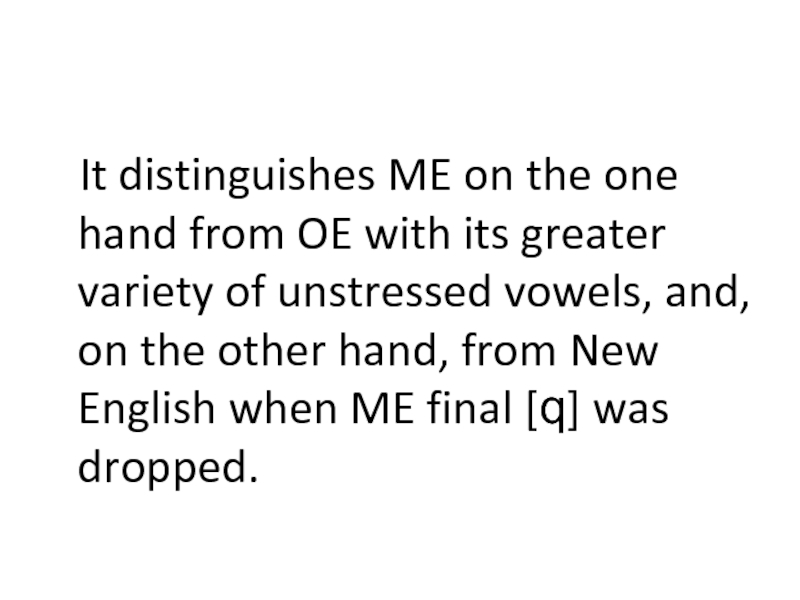
Слайд 10The final [q] disappeared in Late ME but it continued
to be spelt as e. In the London dialect of
Chaucer’s time it was unstable. It could be easily missed out before the following initial vowel or when required by rhythm.
![MIDDLE ENGLISH: CHANGES IN PHONETIC SYSTEM Word Stress The final [q] disappeared in Late ME but it continued to The final [q] disappeared in Late ME but it continued to be spelt as e. In the](https://theslide.ru/img/thumbs/16a70caab344413ded6cad6bf4a84f98-800x.jpg)
Слайд 11When the ending e survived only in spelling, it was
understood as means of showing the length of the vowel
in the preceding syllable and was added to the
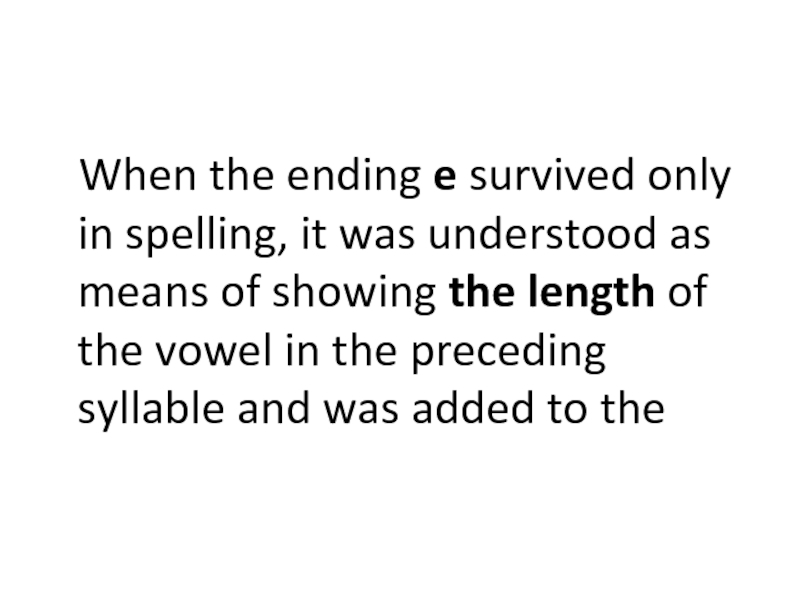
Слайд 12words which did not have this ending before:
OE stan –
ME stoon, stone
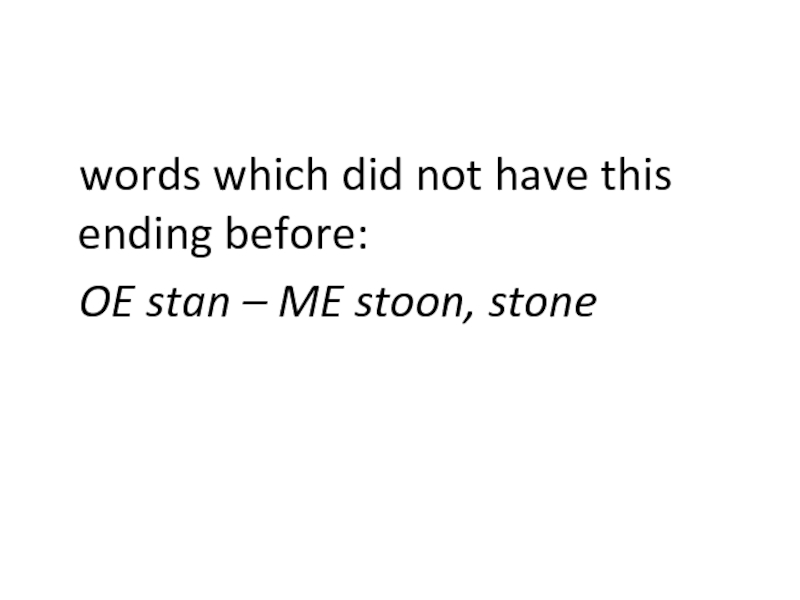
Слайд 13But new unstressed vowels appeared in borrowed words or developed
from stressed ones, as a result of various changes:
e.g. vocalization
of [r]
writer [er] [q]
actor [or] [q]
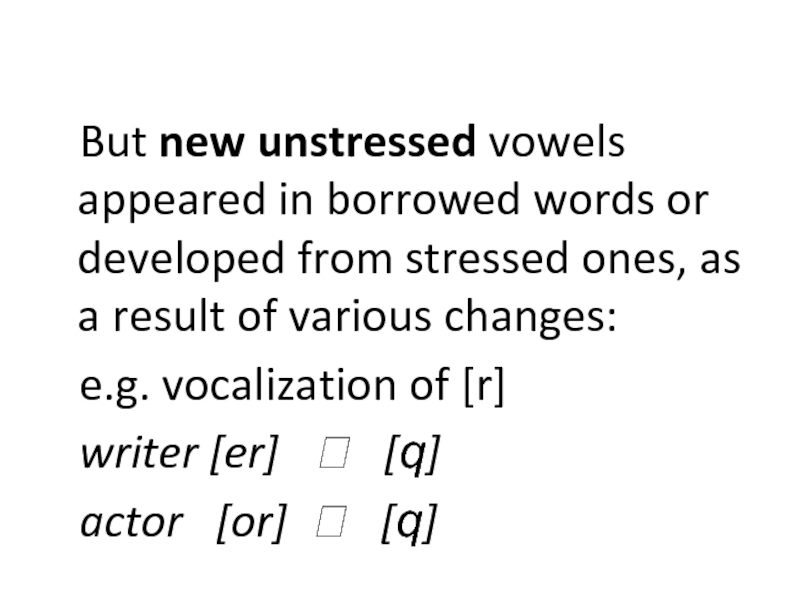
Слайд 14
Stressed Vowels:
Stressed vowels changed in quality and in quantity. Not
a single OE monophthong or diphthong remained unchanged in the
course of history.
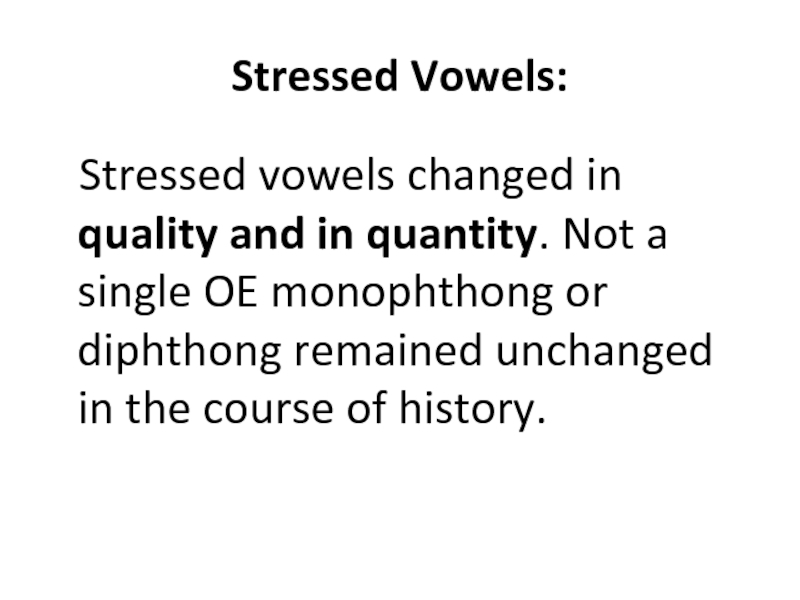
Слайд 15
Quantitative Changes
In OE quantity was the main basis of correlation
in the vowel system: short vowels were opposed to long
ones.

Слайд 16Vowel length was an inherited feature as OE short vowels
developed from PG short vowels. In late OE and Early
ME vowel length began to depend on phonetic condition.
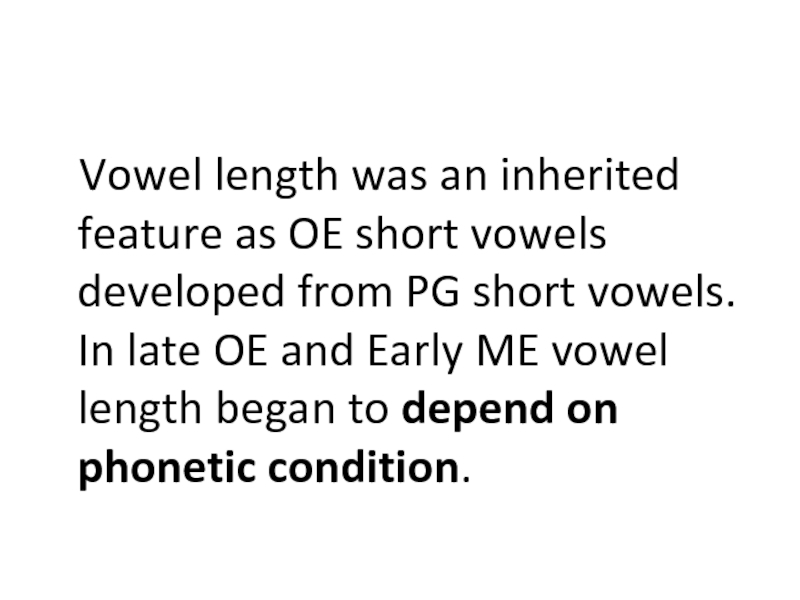
Слайд 171. Short vowels were lengthened before ld, nd, mb unless
followed by a third consonant (the 9-th c.)
OE wild >
ME wild [wJld]
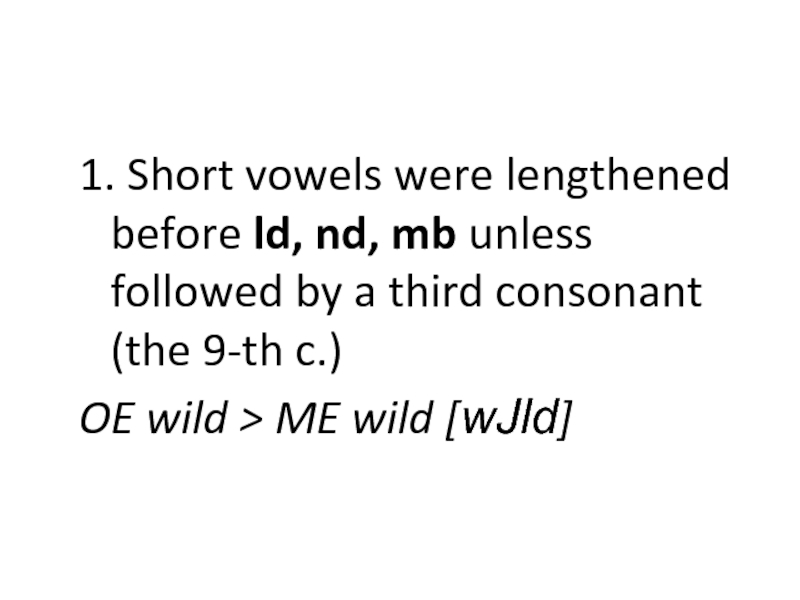
Слайд 182. All other groups of two or more consonants made
the preceding long vowels short (11-th
c.)
OE cepte > ME kepte [‘keptq]
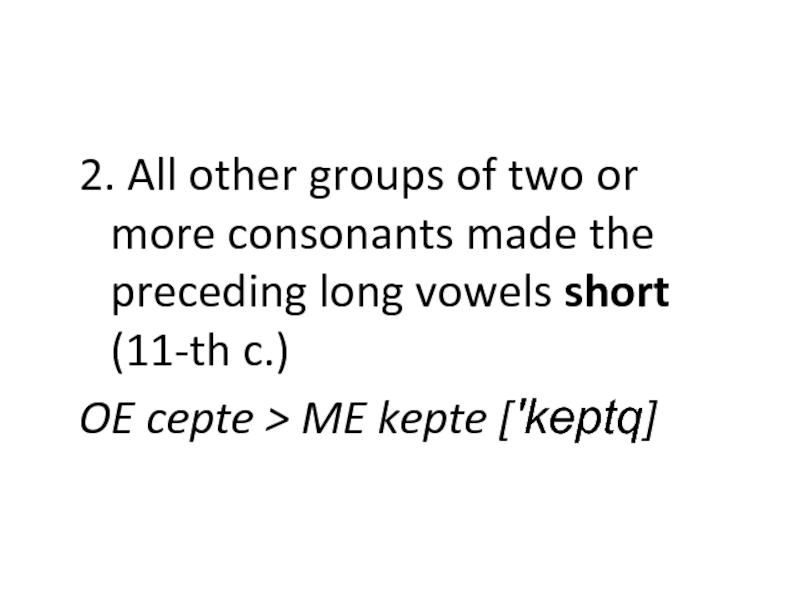
Слайд 193. Short vowels became long in open syllables (mainly [e],
[a], [o]) (12-th – 13-th c.)
OE open > ME open
[‘Lpqn]
OE namu > ME name [‘nRmq]
![MIDDLE ENGLISH: CHANGES IN PHONETIC SYSTEM Word Stress 3. Short vowels became long in open syllables (mainly [e], [a], 3. Short vowels became long in open syllables (mainly [e], [a], [o]) (12-th – 13-th c.)OE open](https://theslide.ru/img/thumbs/acd0e0ba96f4d3f2b7d0f336fd8fb22a-800x.jpg)
Слайд 20
Qualitative Changes
1. OE y, y: disappeared in ME merging with
various sounds in different dialects:
Kentish e, e:
South-West, West Midlands
u, H
East Midland and Northern i

Слайд 21OE fyllan > ME Kentish
fellen
(to fill)
West Midland fullen 1. [fyllqn]
and South western 2. [fullqn]
East Midland fillen
Northern
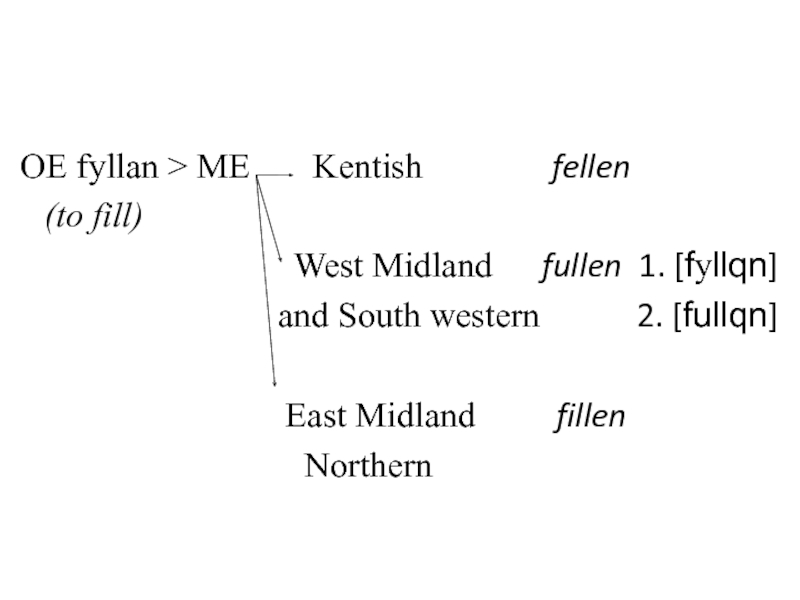
Слайд 222. OE [R] was narrowed to [L] (all
long monophthongs became closer)
[R] > [L] in all the dialects
except the Northern group
![MIDDLE ENGLISH: CHANGES IN PHONETIC SYSTEM Word Stress 2. OE [R] was narrowed to [L] (all long monophthongs 2. OE [R] was narrowed to [L] (all long monophthongs became closer)[R] > [L] in](https://theslide.ru/img/thumbs/0c24b193de2fc8780f1e3e7720fb603e-800x.jpg)
Слайд 23OE stan > ME stoon, stone [‘stLn(q)]
(stone)
Northern stan(e)
![MIDDLE ENGLISH: CHANGES IN PHONETIC SYSTEM Word Stress OE stan > ME stoon, stone ['stLn(q)] (stone) Northern stan(e) OE stan > ME stoon, stone ['stLn(q)] (stone)](https://theslide.ru/img/thumbs/d7113a33db3aa0d453864c394b97e036-800x.jpg)
Слайд 243. OE short [x] > ME back [a]
e.g. OE þxt
> ME that [a]
![MIDDLE ENGLISH: CHANGES IN PHONETIC SYSTEM Word Stress 3. OE short [x] > ME back [a] e.g. OE þxt > ME that [a] 3. OE short [x] > ME back [a] e.g. OE þxt > ME that [a]](https://theslide.ru/img/thumbs/c34752e8020cb5f384f9f47808e165c1-800x.jpg)
Слайд 25
Diphthongs
One of the most important sound changes of the Early
ME period was the loss of OE diphthongs and the
growth of new ones.
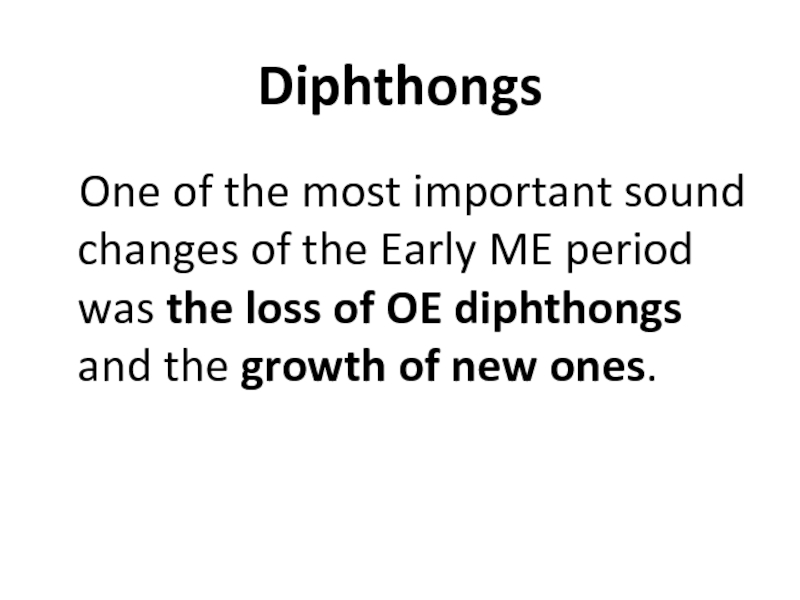
Слайд 26Diphthongs> monophthongs
OE diphthongs were contracted to monophthongs:
OE [eQ] > ME
[F:] east > eest (east)
OE [eQ] > ME [a]
earm > arm (arm)
![MIDDLE ENGLISH: CHANGES IN PHONETIC SYSTEM Word Stress Diphthongs> monophthongsOE diphthongs were contracted to monophthongs:OE [eQ] > ME [F:] Diphthongs> monophthongsOE diphthongs were contracted to monophthongs:OE [eQ] > ME [F:] east > eest (east)OE [eQ]](https://theslide.ru/img/thumbs/1d875bea07724ef49725aa027b29d3b7-800x.jpg)
Слайд 27[eo]
[eo] [e:] [e]
[io]
[J] [I]
[io]
deop > deep [e:] (deep);
ceosan > chesen [‘Ce:zqn] (choose)
heorte > herte (heart)
![MIDDLE ENGLISH: CHANGES IN PHONETIC SYSTEM Word Stress [eo][eo] [e:] [e][io] [J] [eo][eo] [e:] [e][io]](https://theslide.ru/img/thumbs/8c213a9c0a61ae0616183f1858107d63-800x.jpg)
Слайд 28 the vowel system lost two sets of diphthongs, long
and short.
a new set of diphthongs developed from some
sequence of vowels and consonants due to the vocalization of OE [j] and [g/h].
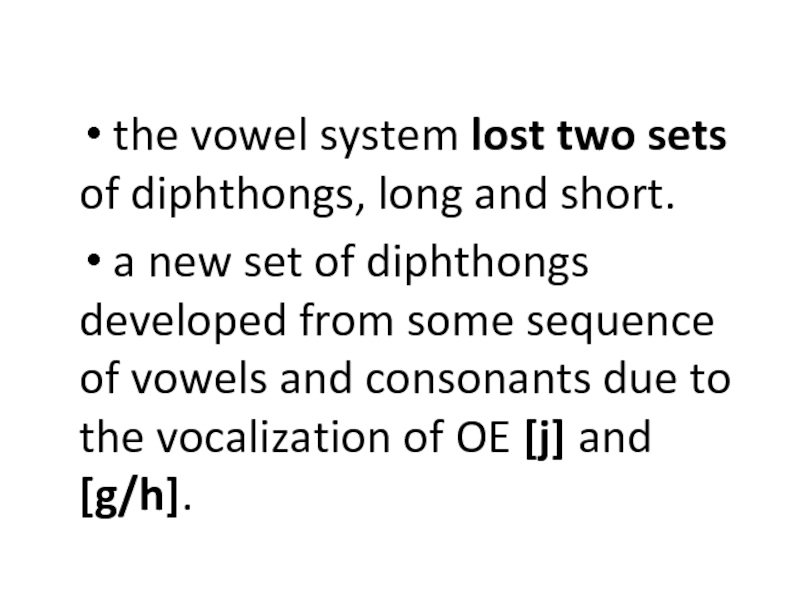
Слайд 29These sounds between and after vowels changed into [i] and
[u] and formed diphthongs together with the preceding vowels:
E.g. OE
dxZ > ME day [daI]
![MIDDLE ENGLISH: CHANGES IN PHONETIC SYSTEM Word Stress These sounds between and after vowels changed into [i] and [u] These sounds between and after vowels changed into [i] and [u] and formed diphthongs together with the](https://theslide.ru/img/thumbs/66336734385797e43ec97a13ac54d9b1-800x.jpg)
Слайд 30Two sets of diphthongs
These changes gave rise to two sets
of diphthongs:
i – glides
u – glides
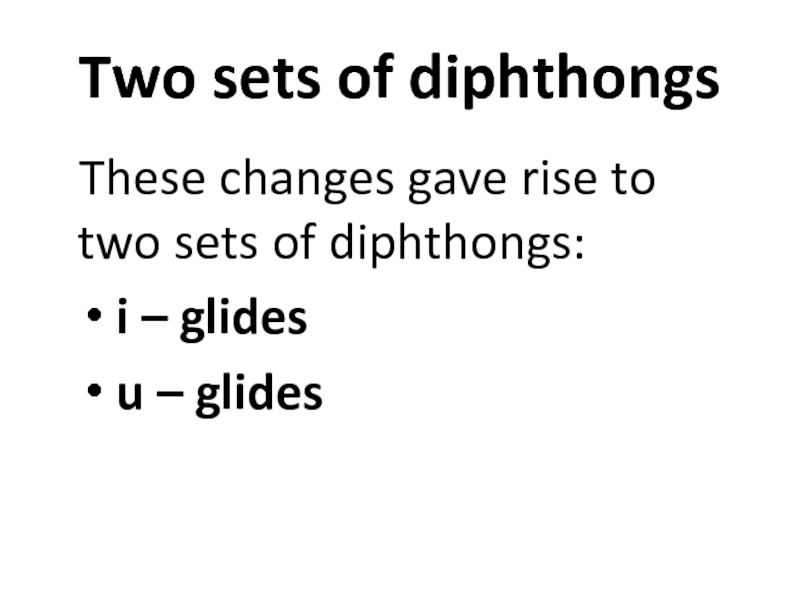
Слайд 31System of vowels in Late Middle English

Слайд 32
Evolution of Consonants
English consonants were far more stable than vowels.

Слайд 33The new type of consonants developed from OE palatal plosives
[k’, g‘, g’] and from [sk’]. The three new phonemes
were [C], [G], [S] (in writing — ch, tch, g, dg, sh, ssh, sch)
![MIDDLE ENGLISH: CHANGES IN PHONETIC SYSTEM Word Stress The new type of consonants developed from OE palatal plosives [k', The new type of consonants developed from OE palatal plosives [k', g‘, g’] and from [sk']. The](https://theslide.ru/img/thumbs/a7933f4ed4b61d5e70e4787fab863cd9-800x.jpg)
Слайд 34
Loss of Consonants
In OE long consonants were opposed to
short. In Late ME long consonants were shortened and the
opposition through quantity was lost.
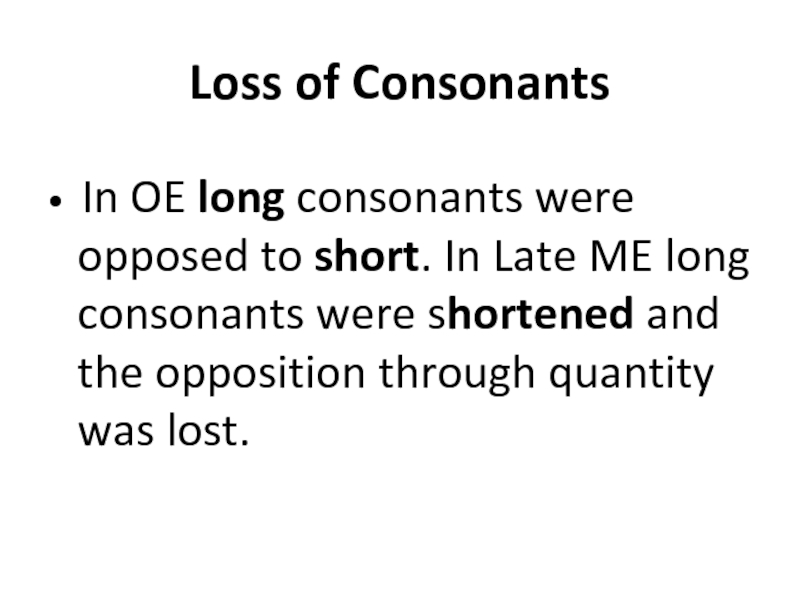
Слайд 35 Initial h was dropped before r, l, n.
OE hrinZ
> ME ring (ring)
OE hlaford > ME loverd (lord)

Слайд 36 Before w h remained in the North where OE
hw > quh or qwh.
In the South h
was dropped before w.
OE hwxt > ME : North quhat
South what
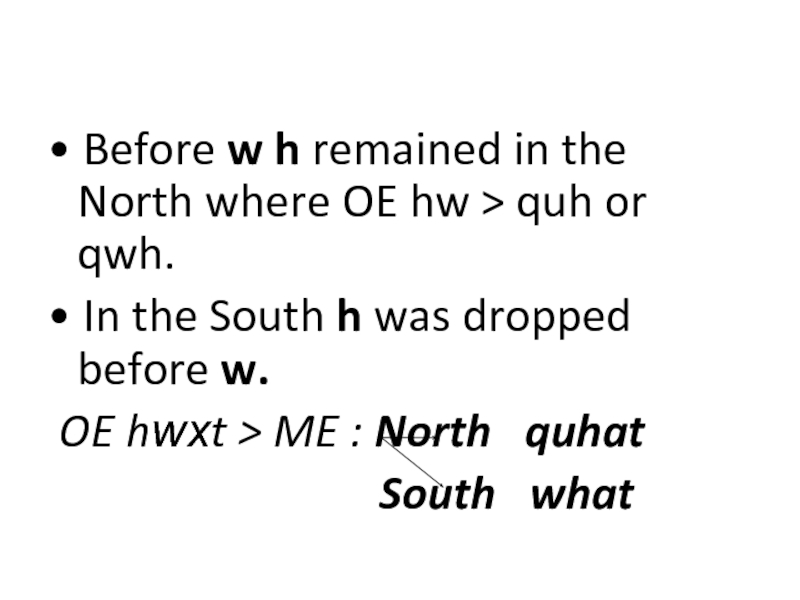
Слайд 37 V was dropped before consonants:
OE hxfde > ME had
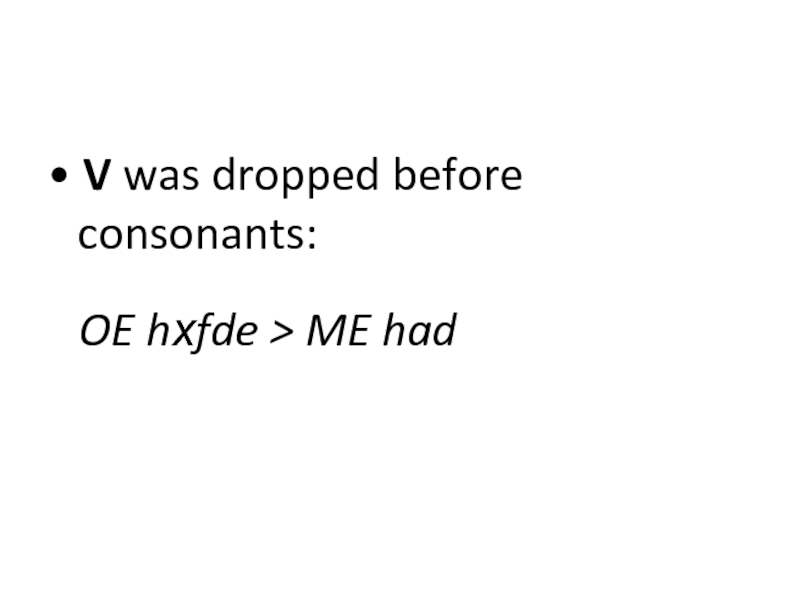
In OE stress as a rule was on the 1-st syllable of the word, rarely on the second syllable.
Изображение слайда
That is the prefix or the root were stressed but the suffixes and endings were unstressed. Word stress in OE was fixed. It didn’t move in inflection and rarely in derivation.
Изображение слайда
In ME period the word stress acquired greater positional freedom and began to play a more important role in word derivation. These changes were connected with the assimilation of the loan words (especially from French).
Изображение слайда
When they first appeared in the English language they probably retained their original stress – on the ultimate syllable. This kind of stress couldn’t be preserved for long.
Изображение слайда
The loan words were assimilated and the stress moved closer to the beginning of the word.
M.E. vertu [ vqr’tjH ] NE virtue [‘ vWtSq ]
Изображение слайда
6
Слайд 6: Vowel Changes Unstressed vowels:
In Early ME the pronunciation of unstressed syllables became increasingly indistinct. In OE there were 5 short vowels in an unstressed position [ e, I, a, o, V ]
Изображение слайда
Late ME had only 2 vowels: [ q ] and [ i ]
OE fiscas – ME fishes [‘ fISqz ]
OE rison – ME risen [‘ rIzqn ]
Изображение слайда
The occurrence of only two vowels [ q ] and [ i ] in unstressed final syllables is an important mark of ME.
Изображение слайда
It distinguishes ME on the one hand from OE with its greater variety of unstressed vowels, and, on the other hand, from New English when ME final [ q ] was dropped.
Изображение слайда
The final [ q ] disappeared in Late ME but it continued to be spelt as e. In the London dialect of Chaucer’s time it was unstable. It could be easily missed out before the following initial vowel or when required by rhythm.
Изображение слайда
When the ending e survived only in spelling, it was understood as means of showing the length of the vowel in the preceding syllable and was added to the
Изображение слайда
words which did not have this ending before:
OE stan – ME stoon, stone
Изображение слайда
But new unstressed vowels appeared in borrowed words or developed from stressed ones, as a result of various changes:
e.g. vocalization of [r]
writer [ er ] [ q ]
actor [or] [ q ]
Изображение слайда
14
Слайд 14: Stressed Vowels:
Stressed vowels changed in quality and in quantity. Not a single OE monophthong or diphthong remained unchanged in the course of history.
Изображение слайда
Long vowels were the most changeable and historically unstable. They had a strong tendency to become narrower and to diphthongize, but short vowels displayed a reverse trend – towards greater openness.
Изображение слайда
16
Слайд 16: Quantitative Changes:
In OE quantity was the main basis of correlation in the vowel system: short vowels were opposed to long ones.
Изображение слайда
Vowel length was an inherited feature as OE short vowels developed from PG short vowels. In late OE and Early ME vowel length began to depend on phonetic condition.
Изображение слайда
1. Short vowels were lengthened before ld, nd, mb unless followed by a third consonant (the 9-th c.)
OE wild > ME wild [ wJld ]
Изображение слайда
2. All other groups of two or more consonants made the preceding long vowels short (11-th c.).
OE cepte > ME kepte [ ‘ keptq ]
Изображение слайда
3. Short vowels became long in open syllables (mainly [e], [a], [o]) (12-th – 13-th c.)
OE open > ME open [ ‘ Lpqn ]
OE namu > ME name [ ‘ nRmq ]
Изображение слайда
21
Слайд 21: Qualitative Changes:
1. OE [y], [y:] disappeared in ME merging with various sounds in different dialects:
In Kentish [ e ] [ e:]
South-West, west Midlands [ u ] [ H ]
Изображение слайда
OE fyllan > ME Kentish fellen
(to fill)
West Midland fullen 1. [ f y llqn ]
and South western 2. [ fu llqn ]
East Midland fillen
and Northern
Изображение слайда
2. OE [ R ] was narrowed to [ L ] ( all long monophthongs became closer)
[ R ] > [ L ] in all the dialects except the Northern group
Изображение слайда
OE stan > ME stoon, stone [ ‘ stLn (q )]
(stone)
Northern stan (e)
ME [ L ] must have been a more open vowel than long [ o: ] inherited from OE
Изображение слайда
3. OE short [ x ] > ME back [ a ]
e.g. OE þ x t > ME that [ a ]
OE earm > ME arm [ a ]
OE blacu > ME blak [ a ]
Изображение слайда
One of the most important sound changes of the Early ME period was the loss of OE diphthongs and the growth of new ones. OE diphthongs were contracted to monophthongs :
Изображение слайда
OE [ eQ ] > ME [ F: ] east > eest (east)
OE [ eQ ] > ME [ a ] earm > arm (arm)
Изображение слайда
[ eo ]
[ eo ] [ e: ] [ e ]
[ io ] [ J ] [ I ]
[ io ]
deop > deep [e:] (deep);
ceosan > chesen [ ‘ Ce:zqn ] (choose)
heorte > herte ( heart )
Изображение слайда
As a result of these changes the vowel system lost two sets of diphthongs, long and short. A new set of diphthongs developed from some sequence of vowels and consonants due to the vocalization of OE [j] and [ɣ].
Изображение слайда
These sounds between and after vowels changed into [ i ] and [ u ] formed diphthongs together with the preceding vowels.
E.g. OE d xZ > ME day [ daI ]
Изображение слайда
These changes gave rise to two sets of diphthongs with i – glides and u – glides.
Изображение слайда
32
Слайд 32: System of vowels in Late Middle English
Изображение слайда
33
Слайд 33: Evolution of Consonants
English consonants were far more stable than vowels.
Изображение слайда
The most important developments in the history of English consonants were the development of affricates and sibilants. In OE there were no affricates and no sibilants except [s, z].
Изображение слайда
The new type of consonants developed from OE palatal plosives [k’, g’] and from [ sk ‘]. The three new phonemes were [ C ], [ G ], [ S ] (in writing — ch, tch, g, dg, sh, ssh, sch )
Изображение слайда
36
Слайд 36: Loss of Consonants
In OE long consonants were opposed to short. In Late ME long consonants were shortened and the opposition through quantity was lost.
Изображение слайда
Initial h was dropped before r, l, n.
OE hrin Z > ME ring (ring)
OE hlaford > ME loverd (lord)
Изображение слайда
Before w h remained in the North where OE hw > quh or qwh.
In the South h was dropped before w.
OE h wx t > ME North quhat
South what
Изображение слайда
39
Последний слайд презентации: MIDDLE ENGLISH: CHANGES IN PHONETIC SYSTEM Word Stress
V was dropped before consonants:
OE h x f de > ME had
Изображение слайда







![Late ME had only 2 vowels: [q] and [i] OE fiscas – ME fishes Late ME had only 2 vowels: [q] and [i] OE fiscas – ME fishes](https://present5.com/presentation/22222136_154538735/image-7.jpg)
![The occurrence of only two vowels [q] and [i] in unstressed final syllables is The occurrence of only two vowels [q] and [i] in unstressed final syllables is](https://present5.com/presentation/22222136_154538735/image-8.jpg)

![The final [q] disappeared in Late ME but it continued to be spelt as The final [q] disappeared in Late ME but it continued to be spelt as](https://present5.com/presentation/22222136_154538735/image-10.jpg)









![3. Short vowels became long in open syllables (mainly [e], [a], [o]) (12 -th 3. Short vowels became long in open syllables (mainly [e], [a], [o]) (12 -th](https://present5.com/presentation/22222136_154538735/image-20.jpg)
![Qualitative Changes: 1. OE [y], [y: ] disappeared in ME merging with various sounds Qualitative Changes: 1. OE [y], [y: ] disappeared in ME merging with various sounds](https://present5.com/presentation/22222136_154538735/image-21.jpg)
![OE fyllan > ME Kentish fellen (to fill) West Midland fullen 1. [fyllqn] and OE fyllan > ME Kentish fellen (to fill) West Midland fullen 1. [fyllqn] and](https://present5.com/presentation/22222136_154538735/image-22.jpg)
![2. OE [R] was narrowed to [L] (all long monophthongs became closer) [R] > 2. OE [R] was narrowed to [L] (all long monophthongs became closer) [R] >](https://present5.com/presentation/22222136_154538735/image-23.jpg)
![OE stan > ME stoon, stone ['st. Ln(q)] (stone) Northern stan(e) ME [L] must OE stan > ME stoon, stone ['st. Ln(q)] (stone) Northern stan(e) ME [L] must](https://present5.com/presentation/22222136_154538735/image-24.jpg)
![3. OE short [x] > ME back [a] e. g. OE þxt > ME 3. OE short [x] > ME back [a] e. g. OE þxt > ME](https://present5.com/presentation/22222136_154538735/image-25.jpg)

![OE [e. Q] > ME [F: ] east > eest (east) OE [e. Q] OE [e. Q] > ME [F: ] east > eest (east) OE [e. Q]](https://present5.com/presentation/22222136_154538735/image-27.jpg)
![[eo] [e: ] [e] [io] [J] [I] [io] deop > deep [e: ] (deep); [eo] [e: ] [e] [io] [J] [I] [io] deop > deep [e: ] (deep);](https://present5.com/presentation/22222136_154538735/image-28.jpg)

![These sounds between and after vowels changed into [i] and [u] formed diphthongs together These sounds between and after vowels changed into [i] and [u] formed diphthongs together](https://present5.com/presentation/22222136_154538735/image-30.jpg)




![The new type of consonants developed from OE palatal plosives [k', g'] and from The new type of consonants developed from OE palatal plosives [k', g'] and from](https://present5.com/presentation/22222136_154538735/image-35.jpg)









![Late ME had only 2 vowels: [q] and [i]
OE fiscas – ME fishes ['fISqz]
OE riso... Late ME had only 2 vowels: [q] and [i]
OE fiscas – ME fishes ['fISqz]
OE riso...](https://documents.infourok.ru/26aebf47-d074-4a95-b3e9-2160c29cd7dc/slide_07.jpg)
![The occurrence of only two vowels [q] and [i] in unstressed final syllables i... The occurrence of only two vowels [q] and [i] in unstressed final syllables i...](https://documents.infourok.ru/26aebf47-d074-4a95-b3e9-2160c29cd7dc/slide_08.jpg)

![The final [q] disappeared in Late ME but it continued to be spelt as e. In th... The final [q] disappeared in Late ME but it continued to be spelt as e. In th...](https://documents.infourok.ru/26aebf47-d074-4a95-b3e9-2160c29cd7dc/slide_10.jpg)








![3. Short vowels became long in open syllables (mainly [e], [a], [o]) (12-th –... 3. Short vowels became long in open syllables (mainly [e], [a], [o]) (12-th –...](https://documents.infourok.ru/26aebf47-d074-4a95-b3e9-2160c29cd7dc/slide_19.jpg)
![Qualitative Changes:1. OE [y], [y:] disappeared in ME merging with various... Qualitative Changes:1. OE [y], [y:] disappeared in ME merging with various...](https://documents.infourok.ru/26aebf47-d074-4a95-b3e9-2160c29cd7dc/slide_20.jpg)

![2. OE [R] was narrowed to [L] (all long monophthongs became closer)
[R] >... 2. OE [R] was narrowed to [L] (all long monophthongs became closer)
[R] >...](https://documents.infourok.ru/26aebf47-d074-4a95-b3e9-2160c29cd7dc/slide_22.jpg)
![OE stan > ME stoon, stone ['stLn(q)]
(stone)
Northern... OE stan > ME stoon, stone ['stLn(q)]
(stone)
Northern...](https://documents.infourok.ru/26aebf47-d074-4a95-b3e9-2160c29cd7dc/slide_23.jpg)
![3. OE short [x] > ME back [a]
e.g. OE þxt > ME that [a]
OE earm > ME arm [a]... 3. OE short [x] > ME back [a]
e.g. OE þxt > ME that [a]
OE earm > ME arm [a]...](https://documents.infourok.ru/26aebf47-d074-4a95-b3e9-2160c29cd7dc/slide_24.jpg)


![[eo]
[eo] [e:] [e]
[io] [J] [I]
[io]... [eo]
[eo] [e:] [e]
[io] [J] [I]
[io]...](https://documents.infourok.ru/26aebf47-d074-4a95-b3e9-2160c29cd7dc/slide_27.jpg)

![These sounds between and after vowels changed into [i] and [u] and formed di... These sounds between and after vowels changed into [i] and [u] and formed di...](https://documents.infourok.ru/26aebf47-d074-4a95-b3e9-2160c29cd7dc/slide_29.jpg)



![The new type of consonants developed from OE palatal plosives [k', g‘, g’] an... The new type of consonants developed from OE palatal plosives [k', g‘, g’] an...](https://documents.infourok.ru/26aebf47-d074-4a95-b3e9-2160c29cd7dc/slide_33.jpg)










































